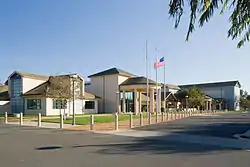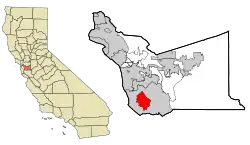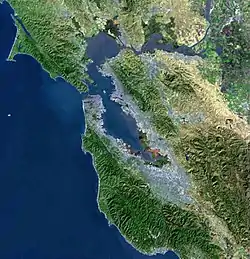Newark, California
Newark is a city in Alameda County, California, United States. It was incorporated as a city in September 1955. Newark is an enclave, surrounded by the city of Fremont. The three cities of Newark, Fremont, and Union City make up the Tri-City Area. Newark's population was 47,529 at the 2020 census[8] making it the third largest city in the US named Newark after Newark, New Jersey, and Newark, Ohio.
Newark, California | |
|---|---|
 Silliman Activity and Family Aquatic Center | |
 Seal | |
 Location in Alameda County and the state of California | |
 Newark, California Location in California  Newark, California Newark, California (the United States)  Newark, California Newark, California (North America) | |
| Coordinates: 37°32′N 122°2′W | |
| Country | |
| State | |
| County | Alameda |
| Incorporated | September 22, 1955[1] |
| Named for | Newark Castle, Port Glasgow |
| Government | |
| • Mayor | Michael K. Hannon[2] |
| • State Senate | Aisha Wahab (D)[3] |
| • State Assembly | Ash Kalra (D)[4] |
| • U. S. Congress | Ro Khanna (D)[5] |
| Area | |
| • Total | 13.94 sq mi (36.11 km2) |
| • Land | 13.92 sq mi (36.05 km2) |
| • Water | 0.02 sq mi (0.06 km2) 0.17% |
| Elevation | 20 ft (6 m) |
| Population | |
| • Total | 47,529 |
| • Density | 3,400/sq mi (1,300/km2) |
| Time zone | UTC−8 (Pacific (PST)) |
| • Summer (DST) | UTC−7 (PDT) |
| ZIP code | 94560 |
| Area code | 510, 341 |
| FIPS code | 06-50916 |
| GNIS feature IDs | 277562, 2411238 |
| Website | www |
Geography

The western edge of the city is near the southern end of the San Francisco Bay. State Route 84 runs through the city, and continues as the Dumbarton Bridge to cross the San Francisco Bay to reach Menlo Park. Interstate 880 serves as the eastern boundary with Fremont.
According to the United States Census Bureau, the city has a total area of 13.9 square miles (36 km2), of which 13.9 square miles (36 km2) is land and 0.02 square miles (0.052 km2), comprising 0.17%, is water.
History
Newark was named after Newark Castle, Port Glasgow, in Scotland by J. Barr Robertson.
Before it was settled by Europeans, Newark was home to the Ohlone Native American Peoples. The first European settlement in the area was by the Spanish missionaries of Mission San José, whose territory covered much of the present-day cities of Newark, Fremont, and Union City. In 1878 land belonging to Washington Township of Alameda County was purchased by The Pacific Land Investment Company and subdivided to form the town of Newark.
Newark was incorporated in September 1955.[9]
Demographics
| Census | Pop. | Note | %± |
|---|---|---|---|
| 1880 | 179 | — | |
| 1950 | 1,532 | — | |
| 1960 | 9,884 | 545.2% | |
| 1970 | 27,153 | 174.7% | |
| 1980 | 32,126 | 18.3% | |
| 1990 | 37,861 | 17.9% | |
| 2000 | 42,471 | 12.2% | |
| 2010 | 42,573 | 0.2% | |
| 2020 | 47,529 | 11.6% | |
| U.S. Decennial Census[10] 1950 Census source[11] | |||
2010
The 2010 United States Census[12] reported that Newark had a population of 42,574. The population density was 3,063.2 inhabitants per square mile (1,182.7/km2). The racial makeup of Newark was 17,567 (41.3%) White, 2,002 (4.7%) Black, 279 (0.7%) Native American, 11,571 (27.2%) Asian, 621 (1.5%) Pacific Islander, 7,735 (18.2%) from other races, and 2,799 (6.6%) from two or more races. Hispanic or Latino of any race were 14,994 persons (35.2%).
The Census reported that 42,428 people (99.7% of the population) lived in households, 145 (0.3%) lived in non-institutionalized group quarters, and 0 (0%) were institutionalized.
There were 12,972 households, out of which 5,643 (43.5%) had children under the age of 18 living in them, 7,832 (60.4%) were opposite-sex married couples living together, 1,716 (13.2%) had a female householder with no husband present, 786 (6.1%) had a male householder with no wife present. There were 659 (5.1%) unmarried opposite-sex partnerships, and 93 (0.7%) same-sex married couples or partnerships. 1,942 households (15.0%) were made up of individuals, and 705 (5.4%) had someone living alone who was 65 years of age or older. The average household size was 3.27. There were 10,334 families (79.7% of all households); the average family size was 3.60.
The age distribution of the population shows 10,799 people (25.4%) under the age of 18, 3,824 people (9.0%) aged 18 to 24, 12,697 people (29.8%) aged 25 to 44, 10,727 people (25.2%) aged 45 to 64, and 4,526 people (10.6%) who were 65 years of age or older. The median age was 35.4 years. For every 100 females, there were 99.3 males. For every 100 females age 18 and over, there were 96.8 males.
There were 13,414 housing units at an average density of 965.2 per square mile (372.7/km2), of which 12,972 were occupied, of which 8,942 (68.9%) were owner-occupied, and 4,030 (31.1%) were occupied by renters. The homeowner vacancy rate was 1.0%; the rental vacancy rate was 4.0%. 28,489 people (66.9% of the population) lived in owner-occupied housing units and 13,939 people (32.7%) lived in rental housing units.
|
2000
As of the census[14] of 2000, there were 42,471 people, 12,992 households, and 10,341 families residing in the city. The population density was 3,039.4 inhabitants per square mile (1,173.5/km2). There were 13,150 housing units at an average density of 941.1 per square mile (363.4/km2).
There were 12,992 households, out of which 40.2% had children under the age of 18 living with them, 62.2% were married couples living together, 11.6% had a female householder with no husband present, and 20.4% were non-families. 14.1% of all households were made up of individuals, and 4.2% had someone living alone who was 65 years of age or older. The average household size was 3.26 and the average family size was 3.59.
In the city, the age distribution of the population shows 27.3% under the age of 18, 9.5% from 18 to 24, 34.3% from 25 to 44, 21.2% from 45 to 64, and 7.8% who were 65 years of age or older. The median age was 33 years. For every 100 females, there were 101.4 males. For every 100 females age 18 and over, there were 99.2 males.
The median income for a household in the city was $69,350, and the median income for a family was $71,351 (these figures had risen to $78,367 and $81,652 respectively as of a 2007 estimate[15]). Males had a median income of $46,061 versus $34,959 for females. The per capita income for the city was $23,641. About 4.2% of families and 5.5% of the population were below the poverty line, including 5.7% of those under age 18 and 6.9% of those age 65 or over.
Politics
In the state legislature, Newark is in the 10th Senate District, represented by Democrat Aisha Wahab,[3] and in the 25th Assembly District, represented by Democrat Ash Kalra.[4] Federally, Newark is in California's 17th congressional district, represented by Democrat Ro Khanna.[5]
Economy
Newark's economy is at the edge of Silicon Valley and shares its economic pattern.
Cargill Salt, previously known as Leslie Salt, operates a large salt refinery in Newark which cleans solar salt produced in salt evaporation ponds in the San Francisco Bay.[16]
Wedgewood manufactured stoves in town from the 1910s until the 1940s.[17][9] Peterbilt manufactured trucks in Newark from the early 1960s up to the mid-1980s.[18] In 1956 Trailmobile moved its manufacturing and assembly plant from Berkeley to a new 208,000-square-foot (19,300 m2) facility at 6000 Stevenson Boulevard in Newark, adjacent to the Peterbilt truck facility. The Trailmobile plant closed in 1975 and moved to a new facility in Charleston, Illinois.[19] From the mid-1950s through the early 1960s, A.O. Smith Corporation of Kankakee, Illinois, built residential and commercial-grade glass-lined water heaters at a large manufacturing facility located on Sycamore Street. The plant was later acquired by the National Steel Corporation, which continued water heater manufacturing at the plant until the early 1970s.
The city houses the NewPark Mall, a super-regional shopping center, with anchor stores Macy's and Burlington Coat Factory, and over 140 other retailers. A 140,000-square-foot (13,000 m2) addition at NewPark, including restaurants, entertainment and a multiplex movie theater with IMAX, opened in late 2015.[20]
The former Sun Microsystems site near I-880, State Route 84 and the Dumbarton Bridge, was purchased by BioMed Realty Trust and is now known as the Pacific Research Center.
Top employers
According to the city's June 2020 Comprehensive Annual Financial Report,[21] the top employers in the city are:
| # | Employer | # of Employees |
|---|---|---|
| 1 | Newark Unified School District | 889 |
| 2 | Logitech | 606 |
| 3 | Risk Management Solutions | 290 |
| 4 | WorldPac | 251 |
| 5 | VM Services Inc. | 241 |
| 6 | Nordstrom Distribution Center | 220 |
| 7 | Cargill Salt | 217 |
| 8 | SMART Modular Technologies | 214 |
| 9 | Amazon Fulfillment Center | 200 |
| 10 | Valassis | 148 |
Culture and recreation
The City of Newark has thirteen parks and sport play facilities,[22] the George M. Silliman Community Activity and Family Aquatic Center (aka the Silliman Center). The Family Aquatic Center portion of the Silliman Center opened in the summer of 2004 and includes a 32,300-square-foot (3,000 m2) indoor swim facility specifically designed for recreation, fitness, and instruction programs for the entire family. The 11,350-square-foot (1,054 m2) Natatorium includes four separate pools, including a 45 ft × 75 ft (14 m × 23 m) Activity Pool; a 245' long Lazy River pool (with a pair of 20' tall, curving water slides); a 4-foot (1.2 m) deep, 4-lane, 25-yard (23 m) Lap Pool; and a 15-person warm-water spa.[23]
Newark also houses a portion of the Don Edwards San Francisco Bay National Wildlife refuge along with the city of Fremont.
Newark also hosts a festival in honor of the city's founding. "Newark Days" is a four-day Festival/Celebration that takes place every September on the Macgregor Soccer fields (adjacent to the Community center on Cedar Blvd).[24]
Transportation
Newark lies near the intersection of I-880, State Route 84, and the Dumbarton Bridge.[25]
Newark is served by AC Transit bus system. Surrounding Fremont is the access point for most transportation services, including Fremont and Union City BART stations, and ACE and Amtrak trains.
Future rail
Caltrain is planning a Dumbarton rail that would run between the Peninsula and Alameda County. This project would add four stations to the Caltrain system: Union City, Fremont-Centerville, Newark, and Menlo Park/East Palo Alto.[26] Dumbarton Rail is currently undergoing environmental and engineering review.
Education
Newark is home to a new campus of Ohlone College, a member of the California Community Colleges system. Other nearby educational centers include the University of Phoenix, ITT Institute, DeVry University, and Unitek College.
Newark has two high schools, Newark Memorial High School and Bridgepoint High School, and one junior high school, Newark Junior High School. Bridgepoint High School is an alternative high school on the MacGregor Campus which also houses Newark Adult School. Elementary schools include Kennedy, Coyote Hills (formerly Graham), Lincoln, Schilling, Birch Grove Primary (K-3)(formerly Bunker), and Birch Grove Intermediate (4-6) (formerly Milani) Schools and one private Catholic elementary-8th grade, St. Edward's Catholic School.
Climate
| Climate data for Newark, California | |||||||||||||
|---|---|---|---|---|---|---|---|---|---|---|---|---|---|
| Month | Jan | Feb | Mar | Apr | May | Jun | Jul | Aug | Sep | Oct | Nov | Dec | Year |
| Record high °F (°C) | 74 (23) |
78 (26) |
84 (29) |
92 (33) |
98 (37) |
107 (42) |
105 (41) |
110 (43) |
103 (39) |
96 (36) |
84 (29) |
75 (24) |
107 (42) |
| Average high °F (°C) | 57.3 (14.1) |
60.8 (16.0) |
63.5 (17.5) |
66.6 (19.2) |
70.2 (21.2) |
74.2 (23.4) |
76.7 (24.8) |
77.0 (25.0) |
77.3 (25.2) |
72.8 (22.7) |
64.6 (18.1) |
58.0 (14.4) |
68.2 (20.1) |
| Average low °F (°C) | 40.6 (4.8) |
43.7 (6.5) |
45.9 (7.7) |
48.2 (9.0) |
51.7 (10.9) |
54.9 (12.7) |
56.4 (13.6) |
57.0 (13.9) |
56.0 (13.3) |
52.3 (11.3) |
46.2 (7.9) |
41.3 (5.2) |
49.5 (9.7) |
| Record low °F (°C) | 22 (−6) |
26 (−3) |
25 (−4) |
32 (0) |
35 (2) |
41 (5) |
44 (7) |
41 (5) |
40 (4) |
33 (1) |
26 (−3) |
21 (−6) |
21 (−6) |
| Average precipitation inches (mm) | 2.96 (75) |
2.52 (64) |
2.10 (53) |
1.02 (26) |
0.41 (10) |
0.10 (2.5) |
0.02 (0.51) |
0.05 (1.3) |
0.13 (3.3) |
0.78 (20) |
1.78 (45) |
2.46 (62) |
14.31 (363) |
| Average snowfall inches (cm) | 0 (0) |
0 (0) |
0 (0) |
0 (0) |
0 (0) |
0 (0) |
0 (0) |
0 (0) |
0 (0) |
0 (0) |
0 (0) |
0 (0) |
0 (0) |
| Source: http://www.wrcc.dri.edu/cgi-bin/cliMAIN.pl?ca6144. | |||||||||||||
Notable people
- Terry Alderete, businesswoman[27]
- Bayley, professional wrestler
- Larry Bettencourt, NFL player for the Green Bay Packers, MLB player for the St. Louis Browns
- Paul Bostaph, drummer
- Rollie Fingers, MLB Hall of Fame relief pitcher[28]
- Chris Flexen, pitcher, Seattle Mariners
- Steven J. Lopes, Bishop of the Personal Ordinariate of the Chair of Saint Peter
- Joey Lucchesi, pitcher, San Diego Padres
- Freddie Muller, infielder, Boston Red Sox[29]
- Rocky Pamplin,[30] author,[31] former football player,[32] member of the Beach Boys
- Joe Rudi, MLB player[33]
- Ron Thompson, guitarist[34]
- Christopher Titus, comedian[35]
- Bill Walsh lived in Newark from 1957 to 1960 while working at Washington High School in Fremont.[36]
- Elaine Welteroth, American journalist and former Editor-in-Chief of Teen Vogue
References
- "California Cities by Incorporation Date". California Association of Local Agency Formation Commissions. Archived from the original (Word) on November 3, 2014. Retrieved March 27, 2013.
- "Mayor Michael K. Hannon". City of Newark. Retrieved September 4, 2023.
- "Senators". State of California. Retrieved March 18, 2013.
- "Members Assembly". State of California. Retrieved March 18, 2013.
- "California's 17th Congressional District - Representatives & District Map". Civic Impulse, LLC. Retrieved March 13, 2013.
- "2019 U.S. Gazetteer Files". United States Census Bureau. Retrieved July 1, 2020.
- "Newark". Geographic Names Information System. United States Geological Survey, United States Department of the Interior.
- "U.S. Census Bureau QuickFacts: Newark city, California". United States Census Bureau. Retrieved September 26, 2021.
- "Newark's Roots". City of Newark official web site. Retrieved June 27, 2023.
- "Census of Population and Housing". Census.gov. Retrieved September 20, 2021.
- "City of Newark, Alameda County - 1950 Census". Bayareacensus.ca.gov. Retrieved September 17, 2016.
- "2010 Census Interactive Population Search: CA – Newark city". U.S. Census Bureau. Archived from the original on July 15, 2014. Retrieved July 12, 2014.
- "Bay Area Census". Bayareacensus.ca.gov. Retrieved July 21, 2020.
- "U.S. Census website". United States Census Bureau. Retrieved January 31, 2008.
- "American FactFinder - Community Facts". Archived from the original on February 11, 2020. Retrieved February 16, 2009.
- "Cargill Salt - San Francisco Bay: About Us". Archived from the original on July 16, 2011. Retrieved August 21, 2011.
- "Archived copy". Archived from the original on August 19, 2018. Retrieved December 17, 2017.
{{cite web}}: CS1 maint: archived copy as title (link) - "History". Peterbilt web site. Archived from the original on February 9, 2013. Retrieved May 29, 2010.
- "History". Coachbuilt.com. Retrieved November 4, 2013.
- "History". Contracostatimes.com. April 2014. Retrieved May 4, 2014.
- "City of Newark CAFR". Newark.org. Retrieved July 21, 2021.
- "Recreation & Community Services: Parks". City of Newark web site. Archived from the original on May 16, 2010. Retrieved May 29, 2010.
- "Silliman Center Official" (PDF). Newark.org. Retrieved April 17, 2008.
- "Historic Newark Days". Newark Days Inc. web site. Retrieved May 29, 2010.
- "google map". Maps.google.com. Retrieved April 17, 2008.
- "Dumbarton Rail Corridor". San Mateo County Transportation Authority. Retrieved January 24, 2007.
- "Terry Alderete". Hispanic Community Affairs Council. Archived from the original on December 12, 2013. Retrieved June 3, 2012.
- "Photographic image : Rollie Fingers card" (JPG). Images.checkoutmycards.com. Retrieved July 21, 2020.
- "Freddie Muller Stats". Baseball-Reference.com. Retrieved July 21, 2020.
- Argus, Saturday, January 23, 1965, Page 4
- Pamplin, Rushton "Rocky"; Hamady, Ron (July 22, 2018). The Beach Boys' Endless Wave: Inside America's Band. ISBN 978-1938620225.
- "Rocky Pamplin, 1968-69 | UO Athletics | Oregon Digital". Oregondigital.org. Retrieved July 21, 2020.
- "Photographic image : Joe Rudi card" (JPG). Images.checkoutmycards.com. Retrieved July 21, 2020.
- "Bay Area blues guitar legend Ron Thompson dies at age 66". Mercurynews.com. February 19, 2020. Retrieved July 21, 2020.
- "Christopher Titus". Tv.com. Retrieved July 21, 2020.
- The Genius: How Bill Walsh Reinvented Football and Created an NFL Dynasty by David Harris
External links
- Official website

- Fremont Macaroni Kid Free family resource with local events and more in Newark, Fremont and Union City.
- Alameda County Library, Newark Branch
- Newark Library Blog
- Newark Unified School District
- U.S. Geological Survey Geographic Names Information System: Newark, California

